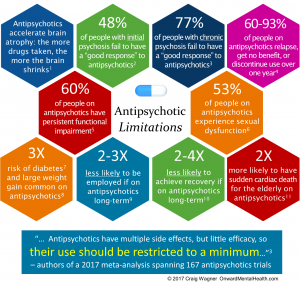The possible benefits of the drugs called “antipsychotics” are pretty easy to comprehend – there is the possibility of a quick calming of what are often chaotic and distressing states of mind, and the risk that chaos will return if the drugs are stopped.
The down sides of the drugs are less easy to grasp. So often they never really figure into treatment decisions.
A new infographic aims to correct that, by summing up those possible down sides in one image:

For those interested, a list of references supporting the infographic are available, as follows:
[1] Fusar-Poli P et al, Progressive brain changes in schizophrenia related to antipsychotic treatment? A meta-analysis of longitudinal MRI studies, Neurosci Biobehav Rev. 2013, PMCID: PMC3964856.
[2] Zhu Y et al, How well do patients with a first episode of schizophrenia respond to antipsychotics: A systematic review and meta-analysis, 2017, European Neuropsychopharm, https://goo.gl/xJTtmZ.
[3] Leucht S et al, Sixty Years of Placebo-Controlled Antipsychotic Drug Trials in Acute Schizophrenia: Systematic Review, Bayesian Meta-Analysis, and Meta-Regression of Efficacy Predictors, 2017, Amer Jof Psychiatry, https://goo.gl/bndxBq.
[4] Moore TJ, The Harms of Antipsychotic Drugs: Evidence from Key Studies, Drug Saf. 2017, PMID: 27864791.
[5] Alenius M, Treatment Response in Psychotic Patients in a Naturalistic Setting, 2009, Uppsala Universitet, https://goo.gl/T7a6EP.
[6] Ucok, Sexual dysfunction in patients with schizophrenia on antipsychotic medication, Eur Psych, 2007, PMID: 17344032.
[7] Rajkumar, AP et al, Endogenous and antipsychotic-related risks for diabetes mellitus in young people with schizophrenia: a Danish population-based cohort study, Am J Psychiatry. 2017, PMID: 28103712.
[8] Xiang Y et al, Almost All Antipsychotics Result in Weight Gain: A Meta-Analysis, 2014, PMCID: PMC3998960;
[9] Harrow M et al, A 20-Year multi-followup longitudinal study assessing whether antipsychotic medications contribute to work functioning in schizophrenia, 2017, Psychiatry Research, PMID: 28651219.
[10] Harrow M, Do all schizophrenia patients need antipsychotic treatment continuously throughout their lifetime? A 20-year longitudinal study, Psychological Medicine, 2012, PMID: 22340278, https://goo.gl/HwUOj8 ; Wunderink et al, Recovery in remitted first-episode psychosis at 7 years of follow-up of an early dose reduction/discontinuation or maintenance treatment strategy: long-term follow-up of a 2-year randomized clinical trial, JAMA Psychiatry. 2013, PMID: 23824214.
[11] Ray et al, Atypical Antipsychotic Drugs and the Risk of Sudden Cardiac Death, NE J Med 2009, PMCID: PMC2713724.
Infographic & footnotes were copied from https://www.onwardmentalhealth.com/recovery-from-schizophrenia
There are other infographics, including one on antidepressants, and one on how a number of factors can pile up to lead to mental health difficulties, at https://www.madinamerica.com/2018/03/8-years-mental-health-research-4-infographics/
One way to make this information more available is to print out a one page handout with this infographic and its footnotes, you can download that here: antipsychotic infographic
I think if this kind of information was commonly contemplated, it would lead to much more circumscribed use of these drugs, and better outcomes for many.
Note: you can find a much more extensive review of the down sides of antipsychotics in Robert Whitaker’s The Case Against Antipsychotics



